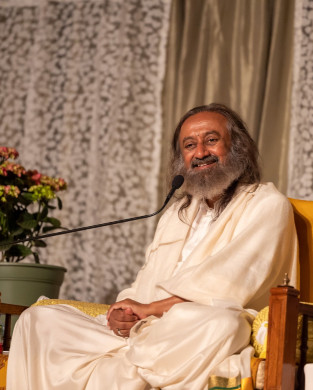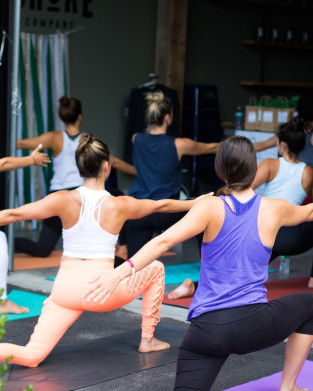The Art of Living Difference

44 years
of service to society

40,000+ centers
worldwide with weekly follow up sessions

180+ countries
where we make a difference

800M+ lives
touched through our courses and events
Our Flagship Courses
The Happiness
program
- Create lasting happiness 500M lives changed
- Evidence-based breathing techniques - practiced for over 42 years
- Proven techniques globally - over 10,000 centres
The Art of Meditation Sahaj Samadhi Meditation
Children &
Youth classes
Yoga classes
Featured in
Free Introduction to the Happiness Program
- Join a Free 75min Introductory Session
- Learn evidence-based breathing techniques to calm the mind
- Experience a guided relaxation & learn about the nature of the mind
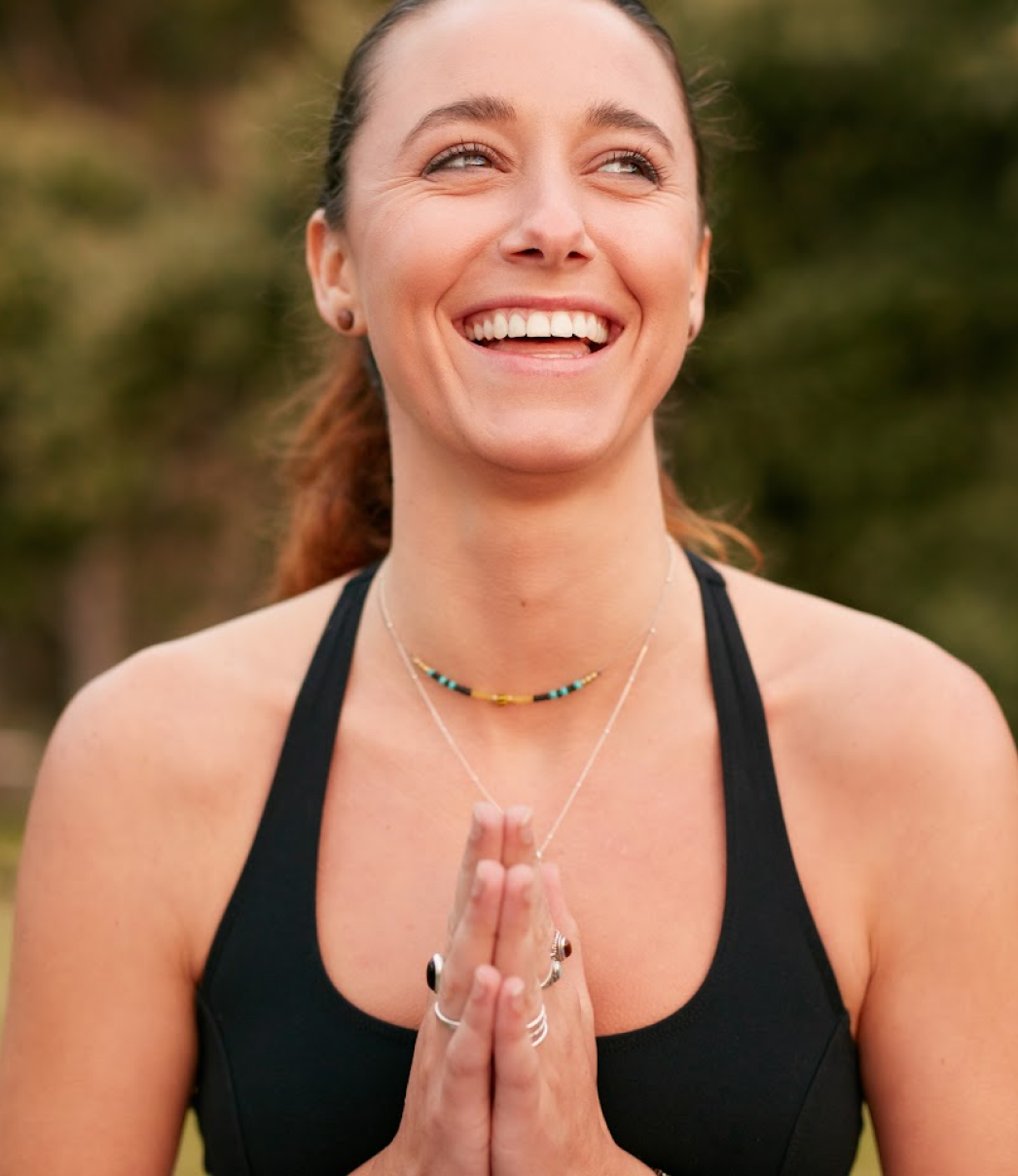
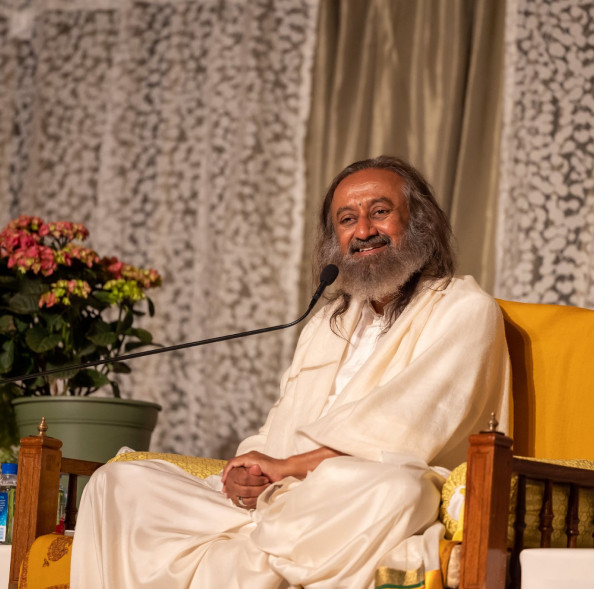
Powerful programs brought to you by Gurudev Sri Sri Ravi Shankar.
Gurudev Sri Sri Ravi Shankar is a global humanitarian, spiritual leader, and peace envoy, who has been teaching breath-based meditation techniques for health and well-being for more than 40 years. His approach blends ancient Vedic wisdom with modern sensibility for a new paradigm of leadership, living a stress-free life and creating a violence-free society.
Through Gurudev’s programs, millions of people worldwide have found peace and resilience in the face of adversity, learning not only how to excel in their own lives, but also how to become powerful agents for social change.
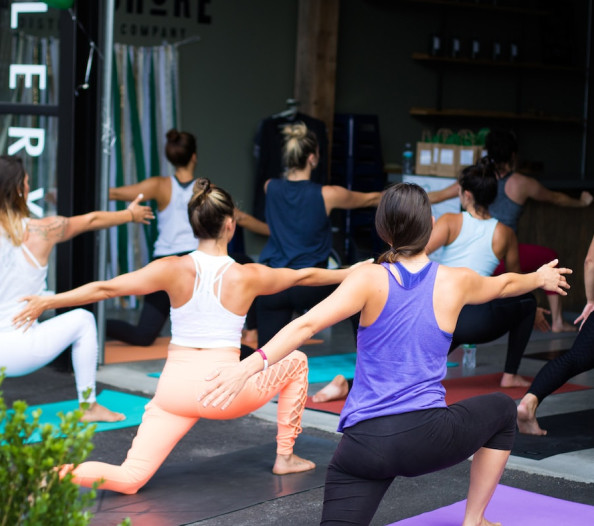
Additional courses
Explore Art of Living’s revolutionary range of courses to help master your mind and develop into your personality.
Sri Sri Yoga
- Authentic yoga practice that deeply benefits the mind.
- Experienced & certified instructors to guide you through evey step of the way.
Kids & Youth Courses
- Build confidence, develop a well-rounded personality, and nurture human values within your child.
- An engaging life-skill program that helps establish their values.
Intuition Process
- Revolutionary two-day program for children and teenagers from 5 years up to 18 years of age.
- Learn Art of Living’s proven techniques on brain activation & meditation.
Happy Experiences
Looking for advanced techniques?
Advanced Courses
*open to people who have completed the Happiness Program
Classes Across Australia
Art of Living hosts meditation and yoga classes across Australia, allowing people to connect with
like-minded individuals to understand the nature of the mind and find peace.
Questions?
The average cost of a mediation class in Brisbane ranges from $20 - $150, averaging around $55 - $60 per class. The cost of meditation classes in Brisbane depends on the type of meditation, the experience, group class or private and the duration of the meditation.
On average, the cost of one-one-one meditation classes in Brisbane ranges from $75–$200 per hour.
As a beginner, we recommend you start with 5 – 10-minute meditations and then gradually build up to 20 minutes or even longer (not required). As a general guideline, 20 minutes is an ideal time to meditate. However, if you feel particularly stressed and wish to create calmness or increase concentration, we recommend you work for up to 30 minutes, including implementing and learning breathing techniques such as the one breath-based meditation called the SKY Breath Meditation technique and Modern Mantra Meditation.
We also recommend you read our article A beginners guide to meditation or 8 tips to get started with Meditation to help you find out some trick and tips to start you on the way.
and watch our video 10 Minute Guided Meditation for Beginners to help you find out some trick and tips to start you on the way.
The time you choose to meditation varies from each person. Realistically, the modern world with all its task, schedules and appointments requires a balance that suits your lifestyle and life.
Most people choose to meditate in the morning, rested for the day. Others prefer at night ready for sleep and relaxation. A modern lifestyle requires a modern meditation schedule
You may find that you experiment and try different times, lighting and locations that suit your lifestyle, your schedule and your preference.
This is YOUR journey; therefore, you need to find what works for you. There is no correct answer, there is no perfect time, you do what is right for you.
With that in mind, there are certain times of day that you may find it easier or preferable to meditate:
- Rise with Sunrise.
Many meditators find Sunrise an effective time to meditate. If you are an early riser, this time may suit you perfectly to start your day off and set the tone for the rest of your day. At Sunrise, the outside world is quiet perfect for quietening the mind and an excellent time for reflection.
- Sunrise, Sunset.
The natural transition from day to night and reversed is also an ideal time for meditation and reflection and is truly a perfect way to start or end the day.
- A quiet time to relax and be present
Choose and reserve a time that suits your household and schedule. If you know there is a particular time when the kids have gone to school, you have some time to yourself or that you know that the house is quiet, then use that time to meditate. Meditation is your time to relax and be present with yourself, a time away from distractions, disruptions and the outside world. Free yourself from distractions and allow yourself the time you deserve.
- Try to create a schedule and meditate the same time every day.
A daily routine helps consequence any hinderances, start finding preferences and eliminates any questions on if you have time or what time is best. At first, try out different times, note down what works for you and then STICK TO IT. Or try at least.
There is a great power in habits, it allows for you to schedule, to plan and to reserve a time for you to allow yourself to focus on you.
If you are new to meditation and using guided meditation, music is fine. But sometimes music or background noise can act as a distraction and hindrance rather than a help. Once you are a pro and have established yourself in your meditation practice, you may not need any music. Here is what our experts share about the pros and cons of using music while meditating
Yes, it is okay to meditate in bed, you can meditate where you feel comfortable, but we do not recommend meditating in bed or lying down. Meditation is a form of conscious relaxation where the mind is alert yet relaxed. When lying down, the mind tends to fall asleep and may cause you to lose your alertness.
The benefits of meditation and assimilation into daily life can help you rest deeply, release stress and get your balance back. Meditation practice, breathing and relaxation techniques have been scientifically backed to release accumulated stress, reduce anger and increase happiness and fulfilment for the mind, body and soul. In addition, some evidence-based studies have shown that meditation may be linked to Alpha Brain Waves and improved brain function. Meditation has also been known to help the sensory organs become more attuned, for example, hearing finer notes within music or better concentration.
There is no such thing as meditating properly or “good” or “bad” meditation. There is no “success” or “failure”. Just like there is no such thing as the perfect meditation. It’s best not to judge your meditation. Meditation is about your growth and journey and is individual to you. However, you can take classes and read guides such as A beginner’s guide to meditation or 8 tips to get started with Meditation to help you learn some tricks and tips to start you on the way. Watch our video 10 Minute Guided Meditation for Beginners. Take your meditation day by day. There is no one size fits all. Sometimes, it’s hard to quiet the mind, and you can feel like you are not meditating correctly and feel like giving up. That is completely normal. With practice, you will learn to navigate these negative thoughts and distractions, which is an important part of your meditation journey and experience- quietening the noise of your mind and life. Meditation is a lifelong journey. Take it session by session, day by day. And don’t expect instant results. Meditation is a skill that grows with patience and practice. You will experience some benefits with each session. And you may start noticing even bigger changes gradually over a period of time. Rather than analysing your present emotions, stay more connected with yourself and enjoy the benefits that follow.
If you are new to meditation and using guided meditation, music is fine. But sometimes music can act as a distraction and hindrance than a help. Once you are a pro and have established yourself in your meditation practice, you may not need any music. Here is what our experts share about the pros and cons of using music while meditating
The time you choose to meditation varies from each person. Realistically, the modern world with all its task, schedules and appointments requires a balance that suits your lifestyle and life.
Most people choose to meditate in the morning, rested for the day. Others prefer at night ready for sleep and relaxation. A modern lifestyle requires a modern meditation schedule
You may find that you experiment and try different times, lighting and locations that suit your lifestyle, your schedule and your preference.
This is YOUR journey; therefore, you need to find what works for you. There is no correct answer, there is no perfect time, you do what is right for you.
With that in mind, there are certain times of day that you may find it easier or preferable to meditate:
- Rise with Sunrise.
Many meditators find Sunrise an effective time to meditate. If you are an early-rise this time may suit you perfectly, to start your day off and set the tone for the rest of your day. At Sunrise, the outside world is quiet which is perfect to quiet the mind and a great time for reflection.
- Sunrise, Sunset.
The natural transition from day to night and reversed is also an ideal time for meditation and reflection and is truly a perfect way to start or end the day.
- A quiet time to relax and be present
Choose and reserve a time that suits your household and schedule. For example, if you know there is a particular time when the kids have gone to school, you have some time to yourself or know that the house is quiet, then use that time to meditate. Meditation is your time to relax and be present with yourself, a time away from distractions, disruptions and the outside world. Free yourself from distractions and allow yourself the time you deserve.
- Try to create a schedule and meditate the same time every day.
A daily routine helps consequence any hinderances, start finding preferences and eliminates any questions on if you have time or what time is best. At first, try out different times, note down what works for you and then STICK TO IT. Or try at least.
There is a great power in habits, it allows for you to schedule, to plan and to reserve a time for you to allow yourself to focus on you.
How long you meditation depends on your preferences, life circumstances, and the time available. You can begin with 5-10 minutes and then gradually build up to 20 minutes or even longer (not required). As a general guideline, 20 minutes is an ideal length of time to meditate.
Yes, before bed is a perfect time to meditate, depending on your schedule. You may find meditation helps you unwind and prepare you for bed. Meditation have been scientifically proven to help aid sleep. Meditating before sleep can help rest your mind and prepare it for sleep. You get a deeper rest from a short 20-minute meditation than sleep and is equal to four hours of undisturbed sleep. Research says, those who meditate can manage to stay productive by sleeping for just five hours.
Although most people choose to meditate in the morning, rested for the day other do prefer at to meditate in bed or at night ready for sleep and relaxation. Choose and reserve a time that suits your household and schedule. If you know there is a particular time when the kids have gone to school, you have some time to yourself or that you know that the house is quiet, then use that time to meditate. Meditation is your time to relax and be present with yourself, a time away from distractions, disruptions and the outside world. Free yourself from distractions and allow yourself the time you deserve.
Meditating before bed and closing your eyes will help quieten the mind and prepare you for sleep, prevent the outside problems from keeping you awake and hindering your journey inwards, allowing you to bring your attention within and fully rest, before and after meditation.
This takes practice, and often closing your eyes can cause your mind to race, therefore focusing on an object and keeping your mind still, then closing your eyes gradually will help gradually close the flow from state of alertness to state of rest. After this you may wish to use this state of rest to fall to sleep naturally.
Meditating and nostril breathing can help you drift off to sleep by quietening the mind. Just like preparing for sleep during meditation, allow your breath to get lighter and smoother. Breathing exercises like alternate nostril breathing and light and even breath can help quiet the mind, prepare you for sleep and bring the mind to an ever-quieter place. As the meditation continues, your breath will slow down and bring the mind to an ever-quieter place on its own. Just like before we drift off to sleep. Read our Sleep Better With Ayurveda article to find out more.
As the eyes are one of your five sense organs, we suggest keeping your eyes closed to heighten your other senses.
When the eyes are open, you remain connected to your surroundings, letting the outside world and thoughts remain and keeping your mind active. Therefore, it cannot fully relax. Closing your eyes will help quieten the mind and prevent the outside problems from hindering your journey inwards, allowing you to bring your attention within and fully rest.
This takes practice, and often closing your eyes can cause your mind to race, therefore focusing on an object and keeping your mind still, then closing your eyes gradually will help gradually close the flow from state of alertness to state of rest.
It’s better to meditate after you can take a shower. This simply removes all the dirt and grime from the day and helps you to meditate better. If you’re meditating in the morning, it’s better to meditate after you bathe.
If you are new to meditation and using guided meditation, music is fine. But sometimes music can act as a distraction and hindrance than a help. Once you are a pro and have established yourself in your meditation practice, you may not need any music. Here is what our experts share about the pros and cons of using music while meditating
To prepare yourself for at home meditation you can:
- Pick the quietest corner in the house.
- Wear loose and comfortable clothing
- Make sure the room is airy and if it is not too cold, open the windows for some fresh air and light to come in.
- For a practice to flower, it is important to give it due respect and sanctity. So, make sure your meditation space is clean and uncluttered.
- Enter the meditation space with a sense of honour and reverence.
- Bring elements of nature into the space—a potted plant or flowers can do, or even light incense or aromatic candles will work.
- Have a small table to place your beads or scriptures on.
- Have a piece of you there. That essentially means, things, spiritual or otherwise, most personal to you—let them adorn the little table. It could be an image of Devi or Christ or whoever it is that you believe in.
- Make sure you spread out a clean yoga mat every day for your practice. Ideally, do not use the mat for any purpose other than meditation.
- Sit In a Comfortable Posture. Your posture makes a difference too. Make sure you are relaxed, comfortable and steady. Sit straight with your spine erect; keep your shoulders and neck relaxed and your eyes closed throughout the process. That you must sit in Padmasana (the lotus position) to meditate is a very common myth of meditation.
- Keep A Relatively Empty Stomach. A good time to meditate is before having a meal. After food, you might doze off while meditating. However, do not force yourself to meditate when you are very hungry. You will find it difficult because of hunger cramps or you may even keep thinking about food the whole time! In this case, you can meditate after two hours after having food.
- Start With A Few Warm-ups. A few warm-ups or sukshma yoga exercises before sitting to meditate help improve circulation, remove inertia and restlessness and make the body feel lighter. You will be able to sit steadily for a longer time.
- Take A Few Deep Breaths. This is again preparation for easy meditation. Deep breathing in and out as well as doing some nadi shodhan pranayama before meditating is always a good idea. This helps to steady the rhythm of the breath and leads the mind into a peaceful meditative state.
To prepare yourself for meditation class you can:
- Choose a Convenient Time. Meditation is essentially relaxation time, so it should be done entirely at your convenience. So, after the meditation you do right now, for the subsequent meditations, choose a time when you know you are not likely to be disturbed and are free to relax and enjoy. The hours of sunrise and sunset, while nature transitions between day and night, are also ideal for the practice.
- Sit In a Comfortable Posture. Your posture makes a difference too. Make sure you are relaxed, comfortable and steady. Sit straight with your spine erect; keep your shoulders and neck relaxed and your eyes closed throughout the process. That you must sit in Padmasana (the lotus position) to meditate is a very common myth of meditation.
- Keep A Relatively Empty Stomach. A good time to meditate is before having a meal. After food, you might doze off while meditating. However, do not force yourself to meditate when you are very hungry. You will find it difficult because of hunger cramps or you may even keep thinking about food the whole time! In this case, you can meditate after two hours after having food.
- Start With A Few Warm-ups. A few warm-ups or sukshma yoga exercises before sitting to meditate help improve circulation, remove inertia and restlessness and make the body feel lighter. You will be able to sit steadily for a longer time.
- Take A Few Deep Breaths. This is again preparation for easy meditation. Deep breathing in and out as well as doing some nadi shodhan pranayama before meditating is always a good idea. This helps to steady the rhythm of the breath and leads the mind into a peaceful meditative state.
Yes, combining exercising and meditation can gave many benefits. Exercising after meditation can help centre your mind further and further energise you for the day. Also, meditating before exercising can help you prepare your body helping relax the muscles. Alternatively, exercising before meditation can help stretch and relax your muscles, prepare you for meditation. We recommend you try both ways and see what works for you or mix it up from one day to the other to fit in with what you feel like doing that day. It is no one size fits all and meditation is different for everyone including how they manage an exercise and meditation routine.
Yes, you can meditate first thing in the morning if that is the time you pick. However, many people meditate in the morning to feel rested for the day. Many meditators find Sunrise an effective time to meditate. If you are an early riser, this time may suit you perfectly to start your day off and set the tone for the rest of your day. At Sunrise, the outside world is quiet, perfect for quietening the mind and an excellent time for reflection. Others prefer to meditate at night, ready for sleep and relaxation. A modern lifestyle requires a modern meditation schedule. The time you choose to meditate varies for each person. Realistically, the modern world, with all its tasks, schedules and appointments, requires a balance that suits your lifestyle and life. You may find that you experiment and try different times, lighting and locations that fit your lifestyle, schedule and preference.
This is YOUR journey; therefore, you need to find what works for you. There is no correct answer, there is no perfect time, you do what is right for you.
With that in mind, there are certain times of day that you may find it easier or preferable to meditate, such as times you know your household is quiet and not busy. We recommend you choose a quiet time to relax and be present and reserve a time that suits your household and schedule. If you know there is a particular time when the kids have gone to school, you have some time to yourself or you know that the house is quiet, then use that time to meditate. Meditation is your time to relax and be present with yourself, a time away from distractions, disruptions and the outside world. Free yourself from distractions and allow yourself the time you deserve.
No, we do not recommend meditating while walking. Standing or walking, will cause the mind to stay active and not relax. Therefore, sitting is the best way to meditate. Therefore, we recommend you sit whilst meditating, Meditation is a form of conscious relaxation where the mind is alert you may find it difficult to let your mind and body truly relax.
Contact and Directions
Brisbane, Queensland, 4000 See Additional Contacts




